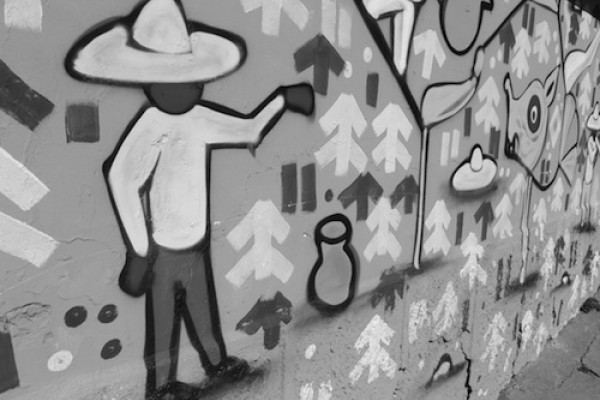Patterns of upheaval
Around the world neoliberalism is facing a reckoning

A popular uprising in Bolivia led to the resignation of President Gonzalo Sánchez de Lozada who threatened further privatization of the country’s natural resources.
Bolivia’s president just resigned following several days of popular and labour uprising and government repression. Once again in Latin America, the issue is one of access to resources (where isn’t it?) – the government wanted to export natural gas resources – Bolivia has Latin America’s largest natural gas reserves – to the United States and Mexico. There’s a definite trend here. In fact, an uprising several years ago in Cochabamba, Bolivia, ended the local privatization of water that made that basic resource unaffordable for poor residents. Today, the Plan Puebla Panama aims to open Mexico and Central America to export, privatization and take-over of resources like natural gas, water and land. While you’re thinking about this, don’t forget privatization of electricity and other public assets here in Canada and the U.S. Public anger is beginning to reach a boil on a much larger scale.
Across Latin America, neoliberal policies push peasants from their land and force them to work, serf-like, for wealthy, absentee and foreign landowners or to become migratory workers travelling to bloated cities like Sao Paolo or Mexico D.F. Alternatively, these policies force poor people to give up their family lives and homes and make dangerous border crossings to become illegal workers. According to Mexican president Vicente Fox, if the money sent back to Mexico by citizens living and working abroad illegally or for minimum wage were included in Mexico’s GNP, that country would be counted among the wealthiest in the world. Mexicans and Caribbeans also take part in a program between their countries and Canada that brings them to our fields to grow vegetables and flowers as comparatively cheap labourers. Here they are not subject to health and safety laws that protect Canadian workers, and they pay taxes to our government without receiving the services Canadians receive for our taxes.
Moving on, let’s consider Africa. Increasingly, many countries in southern Africa have real problems with sexual violence - against both women and - and this is where it gets truly horrifying - children. Certainly it’s not the only place in the world where misogyny and violence against both women and kids is a deep, dark not-so-secret. But the magnitude really is disturbing. An article in the Globe and Mail reports that sixty children are raped every day in South Africa. Infant rape is particularly difficult to understand - it isn’t profitable, and it is likely to be physically painful to the perpetrator as well as the victim. “We believe that something is wrong within the fabric of our society,” deputy president Jacob Zuma has said.
What could that be? Well, look at the context in which it’s happening. South Africa has been environmentally and psychologically ravaged by apartheid. Neoliberal restructuring of the labour market has exacerbated socio-economic inequality. In Southern Africa, AIDS is called not an epidemic, but a pandemic - whole populations are essentially disappearing from certain areas. Here politicians casually employ apocalyptic words like extinction and annihilation, usually better suited to fire-and-brimstone preachers but entirely appropriate in this context. The extent of this greatest of all human plagues, as well as sexual violence and child and infant sexual abuse, is not due to cultural mores that have been in place for centuries (whether supportive or oppressive of women). Instead, it’s largely the sad fall-out of colonization and apartheid or, in countries outside South Africa, apartheid-style policies.
Specifically, the homelands created under apartheid that saw members of different ethnic groups “sent back” to newly created homelands and arable land hogged by the ruling white minority are largely responsible for HIV’s dramatic spread in South Africa. Impoverished Africans were forced to become migrant labourers, working for example in mines far from their homes and families. Rarely able to afford a trip home, they frequented prostitutes or formed new relationships, as often did the women back home. Infected workers eventually spread the disease back to the home community before dying of the effects of full-blown AIDS.
The apparent lack of vengeance behaviour against the white rulers who despoiled – shall we say raped? – that beautiful country apparently conceals some very deep psychological issues, issues that are exacerbated by the Biblical-level scourge of AIDS and the lack of the economic change promised in 1994. Either way, the poor suffer not only during historical trauma, but afterwards as well. With a world so deeply messed up by oppressive policies, inhumane economics and staggering hypocrisy, it’s no wonder people go a little nuts. Flying planes into buildings is nothing.
This article appeared in the November/December 2003 issue of Canadian Dimension .








_600_400_90_s_c1.jpg)
